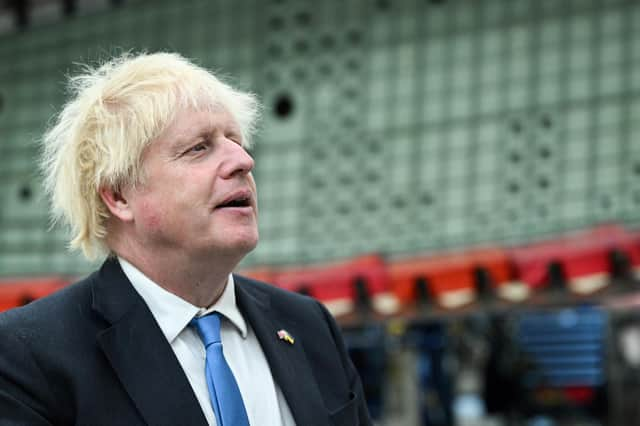Boris Johnson baters might have reason to regret calling for him to be removed - Brian Monteith


How else can it be explained that Scotland’s First Minister is stomping her feet about the need for the UK government to do something about the cost-of-lockdown crisis but at the same time thinks it appropriate to pose for photographs in the Guardian wearing an expensive rig-out with “all clothes from Harvey Nichols, Edinburgh:”.
The Jimmy Choo shoes alone could probably buy a month or two’s groceries for a family of four, never mind the remainder of the outfit.
Advertisement
Hide AdAdvertisement
Hide AdThe festival Fringe has been graced by a number of political events and it was encouraging from an anti-nationalist point of view to see the best attended shows at broadcaster Iain Dale’s easy chair chats were Labour leader Sir Keir Starmer and former Conservative MP Rory Stewart, whereas the rows of empty seats at Nicola Sturgeon’s indulgence was quite noticeable.
No doubt SNP admirers of Sturgeon might argue Starmer and Stewart’s numbers were inflated by English tourists attending the City’s arts jamboree but that would rather confound the social media spin that the English would rather have had her as PM than Boris and she is an international feminist icon.
More likely is the Sturgeon moon is now in the descendant. Or maybe her followers were too busy trying on Jimmy Choo shoes at Harvey Nicks?
More seriously, as we endure the overlong election campaign for Conservative Party leader and thus the Prime Minister, I cannot help but think that those who were clamouring from the day after his election that Boris Johnson be removed forthwith might soon have reason to regret their wishes.
The Conservative argument for Boris staying was that to them he was an electoral winner. He did after all win London Mayor twice – against the prevailing tide – and despite his numerous gaffes and personal misbehaviour had a loyal following that was very forgiving. An election would have presented a choice in contrast to other leaders that, given Johnson’s communication skills, might well have seen him regain enough popularity to win a second term.
Maybe building up support for Boris to go was actually a bluff, maybe his electoral abilities were what was really feared and his removal was not about improving public morals or political standards but really about trying to undermine Brexit or help Labour win an election?
This is where collectivist hacks have to be careful what they wish for – as the removal of Johnson might simply prolong the Conservatives in power. Worse for them, it might mean a more conservative government, one that Johnson’s opponents might abhor more than they did the man himself.
Let us go back to 1990 and recall that for all her supposed unpopularity the influences on the removal of Margaret Thatcher were many and not simply the “Poll Tax”, as is often argued. Her wising-up to the regional political problems the UK faced from the eventual enhanced economic strength of a reunified Germany working in concert with France against British interests, the dangers of a single EU currency being forced upon Britain, and the further federalisation of the EU were all significant drivers behind her removal. Also, the logjam that had built up in the system of government ministerial promotions due to her remaining in power with few electoral clear-outs created an incentive to remove her.
Advertisement
Hide AdAdvertisement
Hide AdThe left and nationalists constantly called for Thatcher’s resignation at the slightest hint of rain, a slow puncture or her helping to win the Cold War. Of course, they also realised, privately, she was a living enigma inside a paradox – for the Tory vote in Scotland was very healthy and all it required was to look at Labour leaders to be reminded that she was a class act.
In the end the conspirators in her own party got their own way and she was convinced by members of her cabinet to resign, despite the pleas of some who wished her to fight on.
Thus John Major came in and rather than be defeated as Thatcher’s enemies had anticipated he famously won the 1992 election and gave the Conservatives a further five years of power. Neil Kinnock was out, replaced first by Argyllshire-born John Smith and then by Edinburgh born Anthony Blair. The rest is modern history.
What chances then that having pushed for the removal of Boris his opponents have only gone and blown the bloody doors off a possible Conservative defeat and instead created the ideal prospects for a Conservative revival? Readers might think it a rather large “what if”, but just say Liz Truss makes a decent go of handling the problems caused by the Bank of England, the Treasury orthodoxy, the sudden sprint towards Net Zero, the failures of SNP government policy (Volumes X, Y, Z)?
“What if” Liz Truss turns out to be a quite straightforward prime minister who, when it comes to political problems that are the known knowns, the known unknowns and those unknown unknowns is actually a breath of fresh air?
A conservative Conservative such as Truss might actually be more popular compared to the liberal Conservative that was Johnson’s premiership or offered by “take the knee Starmer” and “Harvey Nichols’ Sturgeon”?
And even if Rishi Sunak pips Liz Truss and becomes prime minister instead, who is to say that he does not go on to beat Labour and the SNP?
My point is simple, Boris’s enemies should have been careful what they wished for and they may yet live to regret having pushed for him to go – only to bring about their own political defeat.
Brian Monteith is a former member of the Scottish and European Parliaments and is editor of ThinkScotland.org
Comments
Want to join the conversation? Please or to comment on this article.